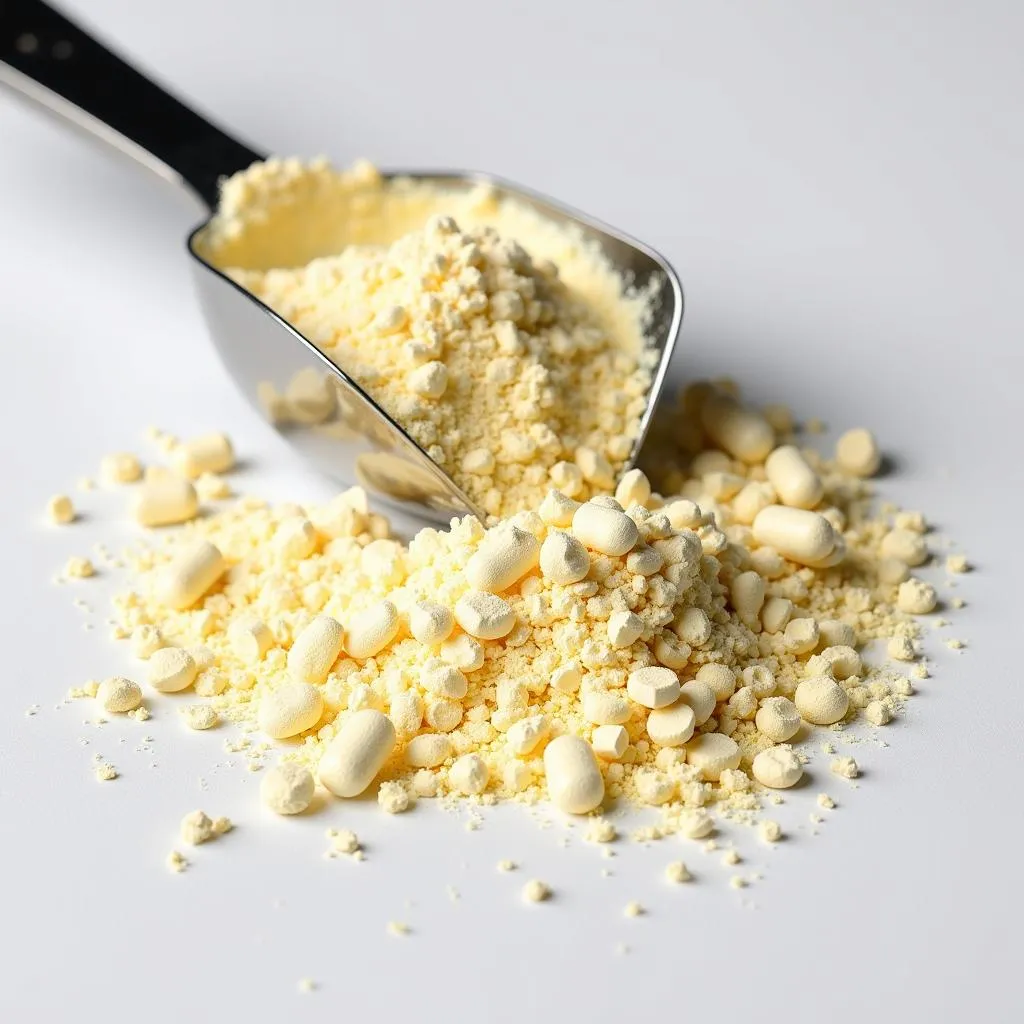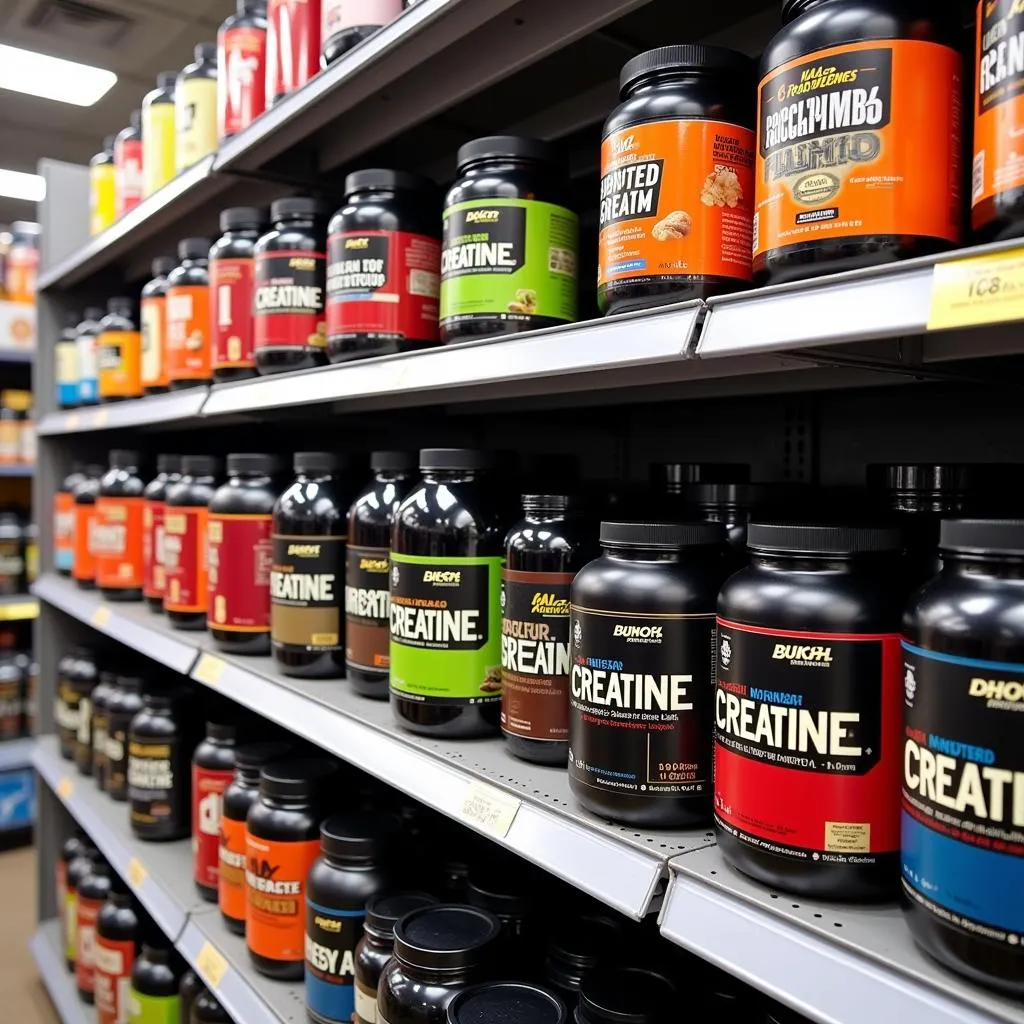Creatine is a popular supplement among athletes and fitness enthusiasts in Pakistan, known for its potential to enhance muscle mass, strength, and athletic performance. This comprehensive guide delves into the various aspects of Creatine In Pakistan, addressing common questions, benefits, potential risks, legal status, and where to buy.
 Creatine powder and scoop
Creatine powder and scoop
Understanding Creatine and Its Mechanisms
Creatine is a naturally occurring substance found in small amounts in foods like red meat and fish. It plays a crucial role in energy production within muscle cells, particularly during high-intensity activities like weightlifting or sprinting.
By supplementing with creatine, individuals aim to increase their muscle creatine stores, potentially leading to:
- Enhanced Strength and Power: Creatine can increase the availability of phosphocreatine, a primary energy source for short bursts of intense exercise, leading to improvements in strength and power output.
- Increased Muscle Mass: Creatine may promote muscle protein synthesis and increase water content within muscle cells, contributing to gains in muscle mass over time.
- Improved Recovery: Supplementing with creatine can help replenish energy stores more efficiently, potentially reducing muscle soreness and improving recovery between workouts.
Is Creatine Legal in Pakistan?
Yes, creatine is legal to buy, sell, and consume in Pakistan. It is not classified as a banned or controlled substance.
Where to Buy Creatine in Pakistan
Creatine is widely available in Pakistan through various channels:
- Supplement Stores: Dedicated supplement stores, both physical and online, are often the primary source for purchasing creatine. They offer a wide range of brands, formulations, and package sizes.
- Gyms and Fitness Centers: Many gyms and fitness centers stock creatine supplements for their members’ convenience.
- Online Retailers: Popular e-commerce platforms in Pakistan feature a wide selection of creatine supplements from both local and international brands.
- Pharmacies: Some pharmacies may carry creatine supplements, particularly those located near gyms or in areas with a high concentration of fitness enthusiasts.
When purchasing creatine in Pakistan, it is essential to prioritize reputable sellers and ensure the product’s authenticity. Look for clear labeling, proper sealing, and certifications from recognized bodies.
 Creatine supplements on display
Creatine supplements on display
Popular Types of Creatine Available
- Creatine Monohydrate: The most common and well-researched form, known for its effectiveness and affordability.
- Creatine Hydrochloride (HCL): Claims to have better solubility and potentially cause less bloating compared to monohydrate.
- Creatine Ethyl Ester: Marketed for its enhanced absorption, although scientific evidence supporting its superiority is limited.
- Creatine Magnesium Chelate: This form is believed to be gentler on the stomach and may offer improved absorption.
Potential Side Effects and Considerations
While generally considered safe for healthy individuals when taken as directed, creatine supplementation may cause some side effects, including:
- Gastrointestinal Issues: Stomach upset, bloating, and diarrhea are possible, especially when starting with high doses.
- Water Retention: Creatine can draw water into muscle cells, which might lead to temporary weight gain or a slightly bloated appearance.
- Kidney or Liver Problems: While rare, individuals with pre-existing kidney or liver conditions should consult their doctor before taking creatine.
Dosage and Timing
The typical creatine dosage is around 3-5 grams per day, often taken after workouts or on rest days. A loading phase of 20 grams per day for the first 5-7 days is sometimes used to saturate muscles more quickly, followed by a maintenance dose.
It’s crucial to follow the recommended dosage instructions on the specific product label and consult a healthcare professional for personalized advice.
 Athlete drinking a creatine shake
Athlete drinking a creatine shake
Choosing the Right Creatine Supplement
- Purity and Quality: Opt for reputable brands that undergo third-party testing to ensure purity and accurate labeling.
- Form of Creatine: Creatine monohydrate is generally the most cost-effective and well-supported by research.
- Additional Ingredients: Some creatine supplements contain added ingredients like electrolytes or amino acids. Consider your individual needs and preferences when making a choice.
- Price: Creatine prices can vary significantly. Compare prices from different sellers while considering the product’s quality and reputation.
Creatine and Specific Fitness Goals
- Muscle Building: Creatine can enhance strength gains, potentially leading to increased muscle mass over time.
- Strength Training: Creatine can improve performance in strength-based activities by providing readily available energy for intense muscle contractions.
- Sports Performance: Athletes in various disciplines may benefit from creatine’s potential to enhance power output, speed, and recovery.
Creatine Myths and Misconceptions
- Creatine is a Steroid: Creatine is a naturally occurring substance and not a steroid. It does not interfere with hormone production.
- Creatine Damages Kidneys: For healthy individuals with normal kidney function, creatine supplementation at recommended doses is not associated with kidney damage.
- Creatine Only Benefits Experienced Athletes: While athletes may experience noticeable benefits, creatine can also be beneficial for recreational fitness enthusiasts looking to improve their strength, power, and body composition.
Conclusion
Creatine is a safe and potentially effective supplement for individuals in Pakistan looking to enhance their athletic performance, increase muscle mass, and improve recovery. By understanding the different types, benefits, potential risks, and where to buy creatine, individuals can make informed decisions about incorporating it into their fitness regimen. Remember to prioritize reputable sellers, follow recommended dosages, and consult a healthcare professional for personalized advice.
FAQs
1. Can women take creatine?
Yes, creatine can be beneficial for women looking to improve strength, body composition, and exercise performance. The same dosage recommendations generally apply.
2. Do I need to cycle creatine?
Cycling creatine (periods of use followed by periods off) is not strictly necessary. However, some individuals choose to do so based on personal preference.
3. Can I take creatine with other supplements?
Creatine can be safely combined with other supplements, such as protein powder, BCAAs, and pre-workout formulas.
4. How long does it take to see results from creatine?
Some individuals may experience noticeable effects within the first few weeks, while others may take longer. Consistent supplementation and training are key.
5. Are there any natural alternatives to creatine?
While no direct replacement for creatine exists, consuming foods rich in creatine, such as red meat and fish, can modestly increase muscle creatine stores.
6. What should I do if I experience side effects from creatine?
If you experience any adverse effects, consider reducing the dosage or discontinuing use. Consult a healthcare professional if symptoms persist or worsen.
7. Can I take creatine if I have a medical condition?
It’s essential to consult your doctor before taking creatine if you have any pre-existing medical conditions, especially kidney or liver problems.
Need More Information?
For further assistance regarding creatine or other fitness supplements, feel free to contact us:
- Phone Number: +923337849799
- Email: news.pakit@gmail.com
- Address: Dera Ghazi Khan Rd, Rakhni, Barkhan, Balochistan, Pakistan
Our dedicated customer support team is available 24/7 to address your queries and provide personalized guidance.